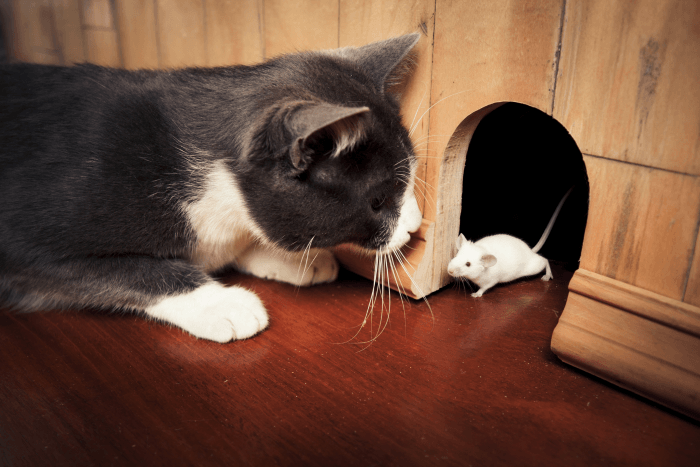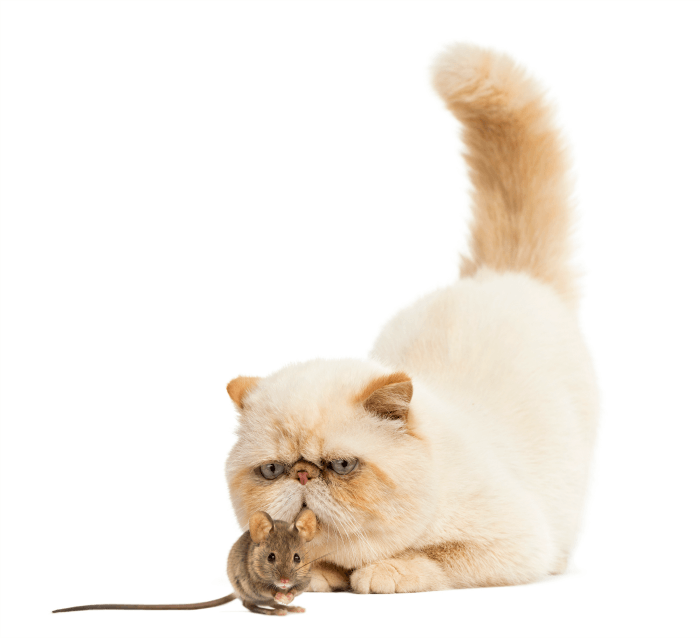On the mouse issue, cats fall into two camps: those who love to chase and eat them, and those who cannot be bothered. Have you ever wondered why some cats eat mice?
Maybe yours doesn’t and you wonder why. Or maybe he does, and you’re wondering why? Let’s explore why some cats eat mice.

Why Do Cats Eat Mice?
Cats are born predators. It may not seem like it when your cute little buddy curls up in your lap and meows at you, but cats instinctively are made to hunt and catch prey. Cats in the wild will hunt for mice and other small creatures to eat. In fact, you can add small birds, reptiles and other small rodents to the list of natural prey for a feral cat.
This is why cats have speedy reflexes, long and sharp claws as well as a strong jaw. They are born to hunt and they’re very good at it. You may see your cat perk up when a bird flies overheard, for example. If your cat spends time outdoors, you might even see her chase birds or small rodents.

However, for domesticated cats, the need to hunt has dwindled. You put their food right there in their bowl and you care for their every need, so why do they need to hunt?
Wild cats, also called feral, don’t have humans to take care of them. This means they have to rely on instinct to survive. They will hunt mice and other small animals for food. Survival by scavenging is another option. Feral cats will also take food left outside for pets, dig through trash cans, or hunt for their food.
Most house cats, however, don’t have this need to hunt any more. They don’t chase or kill mice because they simply have no need to. There are some exceptions to the rule.

If you got your cat as a kitten and you’ve cared for him his whole life, he probably doesn’t have any instinct to hunt for food. If you adopted a once-feral cat, he may still have those hunter instincts in him. Again, there are exceptions to this rule as well.
Some cats, even if they were born domesticated, or from a long line of domestic house cats, will have a strong hunter’s instinct. They may like to chase, hunt, and eat mice. They might even bring the reward of their kill to you from time to time. Anyone who’s ever woken up to a dead mouse at the foot of their bed will know what we’re talking about. Take it as a compliment. Your kitty means well.

Even domestic cats with access to outside may sometimes want to chase or play with mice. For this reason, you also need to take some safety precautions. If your cat is a mouse-chaser, you need to be very careful about pesticides and rodent poisons.
If your cat eats a mouse that is poisoned, your cat will get sick or could even be at risk for death. This is something to be aware of when you have a cat that likes to chase mice.
Jo-Anne Pfoh says
Don’t you mean eat and then throw up but leave the head for you to find? All my outdoor rescue kitties chase mice. All my shelter kitties could care less lol
Holly/Emilia says
I live in an old house in the woods and mice come in to visit in the winter (if they have a death wise.) My Musette is a master mouser. She used to be a farm cat. She doesn’t waste any time fooling around and playing with them. She gets really still, with her whiskers and ears pricked forward and staring at the area the mouse is hiding. Then all of a sudden she springs and pounces and bang – dead mouse! She never eats them, but she kills them with major efficiency.
Deborah Anemaet says
My cat if fed regularly and always food about .
But he is still eating mice .
Brings back rats ,not to many birds as he has a bell . Mice are obviously deaf lol